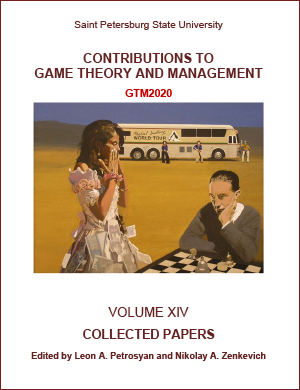Cooperative Game Theory Methods in the Analysis of Economic and Political Interaction at the International Level
DOI:
https://doi.org/10.21638/11701/spbu31.2021.15Abstract
The main attention is focused on the application of the methods of the theory of cooperative games to the analysis of the relationship between the leading actors in international politics, or, as they say, the centers of power. One of the specific features of the modern world is the "triple type" of conflicts. Namely, at different levels of relationships, conflict situations with three participants (players) are often observed. Such situations are objectively characterized by the formation of possible paired coalitions, rejecting the third. The main idea of the proposed approach is the transition from cooperative games with deterministic values of characteristic functions to their counterparts with stochastic values. One of the possible concepts of solutions for stochastic cooperative games is associated with the extension of the ideas of the bargaining set to them. Problems of development and interpretation of this concept in the case of a triple conflict of international centers of power. An essential advantage of this approach is the possibility of meaningful interpretations of the significance level, at which the conditions for the rationality of the shares of the players should be ensured, taking into account the non-determinism of their utilities given by the characteristic function.
Keywords:
game theory, cooperative games, stochastic cooperative games, bargaining set, intercountry interaction, centers of power
Downloads
References
Downloads
Published
How to Cite
Issue
Section
License
Articles of "Contributions to Game Theory and Management" are open access distributed under the terms of the License Agreement with Saint Petersburg State University, which permits to the authors unrestricted distribution and self-archiving free of charge.




